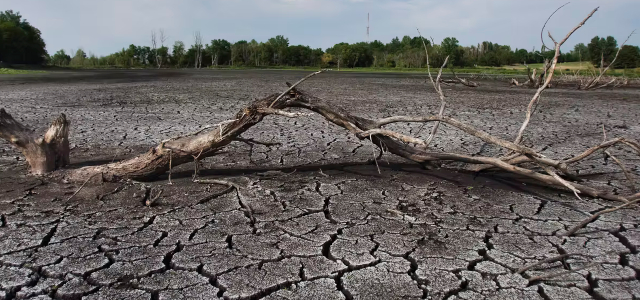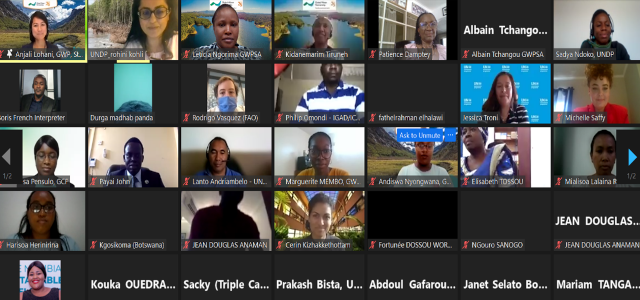
Some of the participants at the webinar
The webinar forms part of the knowledge exchange outcome of the NAP-GSP programme, jointly led by United Nations Development Programme (UNDP) and the United Nations Environment Programme (UNEP). The webinar provided an overview of processes and requirements for accessing GCF Readiness Support for NAPs and was composed of country case studies, which showcased good practices and lessons learned. The webinar also provided a platform to discuss areas of support that are required by countries to access GCF readiness support.
Introduction to the NAP GSP and NAP Formulation process
Ms Rohini Kohli, Team Leader at UNDP provided an overview of the NAP-GSP and the NAP formulation process giving examples of milestones that the programme has achieved in the past years.
“The NAP-GSP is a joint programme between UNDP and UNEP funded by the GEF, which has been working with partners since 2014 to support adaptation integration into development planning and to support the formation of NAPs Roadmap”, said Rohini. “The programme has supported 28 Least developed countries (LDCs), while on the regional front UNEP has led the development of the south-south exchange.
She highlighted that since 2020, UNDP has supported seven LDCs to submit their national adaptation plan. These are seven Burundi, Central African Republic, Chad, Congo, Democratic Republic of Congo (DRC), Sierra Leone, and South Sudan.
She avowed UNPD’s commitment to continuing supporting the NDC Revision under our climate even beyond the tenure of the programme which is in final stages.
GCF’s Readiness and Preparatory Support Programme
Ms Chibesa Pensulo, Adaptation Specialist at the Green Climate Fund (GCF) gave insights on the GCF’s Readiness and Preparatory Support Programme (the Readiness Programme), which provides grants and technical assistance to strengthen the institutional and technical capacities National Designated Authorities (NDAs), key NDA partners and Direct Access Entities (DAEs). She also provided an update on the current status of the NAP pipeline and portfolio, outlining critical elements that of adaptation planning proposals. Ms Pensulo highlighted that one of the key challenges that is delaying the approval of Readiness projects is miscommunication between the GCF and delivery partners. In cases where a delivery partner is not clear about the Readiness programme requirements or feedback from GCF on the Readiness proposal, the delivery partner should request a virtual meeting with the GCF team so that delays in through miscommunication can be avoided.
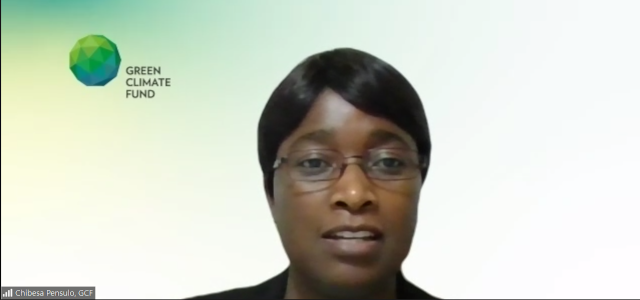
Ms Chibesa Pensulo, Adaptation Specialist at the Green Climate Fund (GCF)
“There are three windows through which governments and the entities supporting them can access funding from the GCF,” she said. “The first one is the readiness support, which avails countries $1 million per country per year to support them in preparing to access climate finance, and up to $3 million for adaptation planning”.
Project Preparation Facility is for concept notes that meet GCF investment criteria and has a cap of $1.5 million per project. The largest funding window, for which there is no cap, is the investment projects fund, under which accredited entities may develop a funding proposal for review by the GCF and an independent technical advisory panel to the Secretariat’s board.
Country case studies of accessing GCF Readiness Support for NAP
Country experiences which were shared from Zambia, Malawi and Bhutan provided good practices and lessons learned from their processes.
Accessing GCF NAP Readiness support-the case of Zambia
Mr Kidanemariam Jembere, GWPSA- ACU Technical Advisor, presented the case of Zambia in Accessing GCF NAP Readiness support. The country received a grant of USD 2 million from the GCF’s Readiness Programme for the implementation of the National Adaptation Planning for Climate Resilience (NAP4CR) Project.
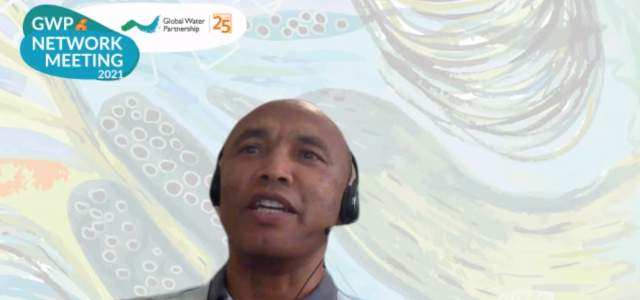
Mr Kidanemariam Jembere – GWPSA Technical Advisor presenting the case of Zambia.
“Following the nomination of GWP by the Zambian government as the delivery partner, we supported the country from preparations before NAP proposal, throughout NAP proposal development, review and approval," said Jembere. ”GWP’s support went beyond the approval as we are currently supporting the government in the implementation of the project which runs from 2020–2022”.
Mr Jembere mentioned that the key lessons learnt in the process of supporting Zambia include the importance of doing stock-taking exercises to review existing policies, strategies, plans, programs, institutional arrangement, data and information in the country. It is also useful to engage stakeholders, mainly the key mandated government organizations in the country. Another important lesson is to raise awareness on climate vulnerabilities and risks, the NAP formulation process and the GCF Readiness Support process.
“Through the Zambia NAP project, we also learnt the importance of building on existing programs and systems and ensure country ownership and alignment with national processes”, said Jembere. “ Key to the success of the collaboration in the NAP process is GWP’s track record, its strong relationship with key mandated institutions, as well as GWPSA capability in terms of technical knowledge and skills”.
Accessing GCF NAP Readiness support-the case of Bhutan Presentation
The case of Bhutan was presented by Tshering Yangzom , from the Bhutan National Environment Commission “The Bhutan NAP was launched in 2015 as a medium- to long-term approach to reduce vulnerability to the adverse effects of climate change, that is integrated with national development planning processes and strategies”, she said. “The NAP built upon existing adaptation policies, plans & projects including the ongoing The National Adaptation Programme of Action (NAPA) which set to identify immediate and urgent threats posed by climate change in Bhutan.”
The Bhutan NAP project ran for four years, with a USD 2.7 million grant received from the GCF. The National Adaptation Programme of Action (NAPA) was the first major exercise to understand the country’s vulnerabilities and propose measures to address them.
Accessing GCF NAP Readiness support-the case of Malawi
The case of Malawi was presented by Mr Evans Njewa from the Environmental Affairs Department, GCF NDA Office.
“Following the approval of the Malawi GCF NAP in March 2019 the government received a Grant worth US$2.8 million to implement the NAP process for 3 years”, said Mr Njewa. “The objective of the NAP process is to reduce the vulnerability of people in Malawi and to promote community and ecosystem resilience to the impacts of climate change and gender-equitable adaptive capacity for planning and implementing adaptation interventions”.
The outcomes of the NAP project in Malawi were to develop capacity and tools for the coordination and execution of future NAP processes, operationalised adaptation priorities through line ministry spending plans, mobilise private sector finance for investment in climate risk management and disseminate lessons about the NAP process.
Outcomes of the workshop
Jessica Troni, UNEP’s Climate Change Adaptation Portfolio Manager, provided a summary of outcomes and officially closed the webinar. The meeting concurred that NAPs are continuous, country-driven, should work across sectors and go down to the subnational level.
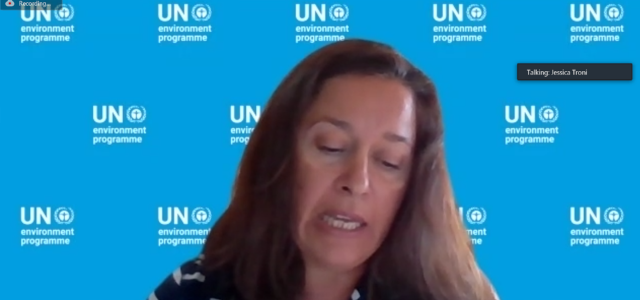
Jessica Troni, UNEP Portfolio Manager
“NAPs should be participatory and inclusive; they should include civil society groups, NGOs, and women among others because all of those different groups have different perspectives on how climate change will affect them and what solutions should be used”, said Troni. NAPs should not dwell on the short term but focus on medium to long term climate risks. Forecasts should range from 5,10, up to 20 years and prepare the country along the adaptation pathway. A NAP that meets all these characteristics is in line with Decision 5 C.P 7 2011 by UNFCCC which is the overarching guidance by COP on NAPs.
Photo Credit (Cover photo) Jim Lo Scalzo
